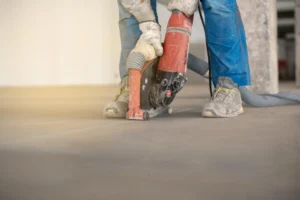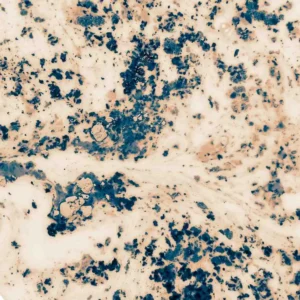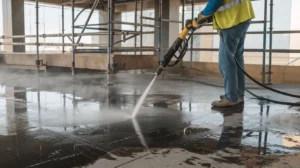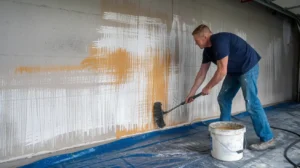Decomposed granite, a popular landscaping material, consists of granitic rock that has weathered and broken down into small particles over time. This natural process occurs through the erosion of granite rocks due to exposure to various environmental factors such as wind, water, and temperature fluctuations.
As granite undergoes weathering, it gradually disintegrates into finer pieces, ranging from gravel-sized particles to sandy textures. This decomposition results in a versatile material known as decomposed granite, which is often utilized in pathways, driveways, and as a base for other construction projects due to its durability and permeability.
What Is Decomposed Granite Used For?

Pathways: It is frequently employed to create natural-looking pathways in gardens, parks, and residential landscapes. Its loose structure allows for easy installation and maintenance.
Driveways: Due to its stability and permeability, it is a popular choice for driveways. It provides a solid surface while allowing water to penetrate, reducing runoff.
Garden Beds: In garden landscaping, it serves as an excellent material for creating raised garden beds. Its porous nature facilitates drainage and aeration, promoting healthy plant growth.
Construction Uses:
Base Material: It acts as a sturdy base material for various construction projects, such as roads, walkways, and patio foundations. Its compactibility and ability to interlock make it an ideal substrate for supporting heavier structures.
Stabilization: In areas prone to erosion, it can be utilized for soil stabilization. Its granular composition helps prevent soil erosion and surface runoff, making it valuable for slope stabilization and erosion control measures.
Decorative Purposes:
Outdoor Living Spaces: It adds a natural and rustic aesthetic to outdoor living spaces, including patios, terraces, and seating areas. Its earthy tones blend well with surrounding vegetation, creating a harmonious landscape design.
Water Features: In landscaping projects featuring water features such as ponds, streams, or waterfalls, it can be used to line the edges or create natural-looking shores. Its permeability allows water to seep through, maintaining proper drainage and circulation within the water feature. For granite services contact no other than Stone Sealer Restoration which has been best in the business for years.
Types of Decomposed Granite

Stabilized VS Unstabilized
Stabilized Decomposed Granite: This type has additives mixed in, such as resins or stabilizers, to help bind the particles together. This creates a more durable surface that is less prone to erosion and washout. Stabilized decomposed granite is often used for pathways, driveways, and other high-traffic areas where stability is crucial.
Unstabilized Decomposed Granite: This is the natural form of decomposed granite without any added binders or stabilizers. It tends to be loose and more prone to erosion, making it suitable for landscaping uses like mulching or filling in low-traffic areas where stability isn’t a major concern.
Grading and Size Variations
It comes in various grades and sizes, which can affect its appearance and suitability for different applications:
Fine Decomposed Granite: This type has smaller particles and a finer texture, making it ideal for compacting and creating a smooth surface for pathways or patios.
Medium Decomposed Granite: With slightly larger particles, medium it is often used for landscaping purposes like mulching flower beds or creating natural-looking pathways.
Coarse Decomposed Granite: This type has larger particles and a rougher texture, making it suitable for more rugged applications like filling in drainage areas or stabilizing slopes.
Regional Varieties
Decomposed granite can vary in color and composition depending on where it’s sourced from:
Western Red/Brown Decomposed Granite: Commonly found in the Western United States, this variety tends to have reddish-brown hues due to its high iron content.
Gray Decomposed Granite: Found in regions with granite formations, this variety has a grayish color and is often used for landscaping in areas where red or brown tones might clash with the surroundings.
Gold/Yellow Decomposed Granite: Some varieties of decomposed granite have a golden or yellowish tint, which can add warmth and brightness to outdoor spaces.
Decomposed Granite Colors
When it comes to decomposed granite colors, you’ve got a range to choose from:
Natural Shades
Earth Tones: These include hues like beige, tan, and rust, reflecting the natural colors found in granite.
Gray: Shades of gray are often present in decomposed granite, offering a neutral yet elegant option.
Brown: From light sandy browns to deeper chocolate tones, brown adds warmth to outdoor spaces.
Enhanced Colors
Dyes and Pigments: Some suppliers offer enhanced colors through dyes and pigments, providing options beyond the natural shades.
Customization Options: You may have the opportunity to customize the color of your decomposed granite to suit your specific project needs, offering endless possibilities for creativity and personalization. For more information about granites visit Stone Sealer Restoration which are best in the business for years.
Pros and Cons
Advantages:
Low Maintenance: It requires minimal upkeep once it’s installed. It typically only needs occasional re-leveling or replenishing.
Environmentally Friendly: It’s a natural material made from granite rock that has weathered and eroded over time. Using it can reduce the need for quarrying new materials.
Cost-Effective: Compared to other hardscape materials like concrete or pavers, decomposed granite tends to be more affordable, making it a budget-friendly option for landscaping projects.
Disadvantages
Permeability: While the permeability of decomposed granite can be an advantage in certain applications, such as allowing water to drain through, it can also be a drawback if you’re trying to create a solid surface for heavy use or in areas prone to erosion.
Durability Issues: Decomposed granite may not hold up well under heavy traffic or extreme weather conditions. It can erode over time, especially if not properly installed or maintained.
Limited Load-Bearing Capacity: It may not be suitable for areas where heavy loads will be placed regularly, as it lacks the structural integrity of materials like concrete or asphalt.
Conclusion
Decomposed granite has emerged as a versatile material with a wide range of applications, making it a popular choice in landscaping and construction projects. Its natural composition, durability, and aesthetic appeal make it ideal for pathways, driveways, and outdoor spaces.
Key points to note include its affordability compared to other paving materials, low maintenance requirements, and environmentally friendly attributes due to its minimal need for water and ability to promote drainage.
Looking ahead, future trends in decomposed granite use are likely to focus on its sustainable features, as eco-conscious consumers seek alternatives to traditional paving materials. Feel free to contact us for any type of query or services related to granites.
FAQs
How is decomposed granite installed?
It is spread and compacted to create a stable surface. It can be installed on top of a weed barrier fabric to prevent weed growth. Depending on the project, a stabilizer may be added to enhance durability and prevent erosion.
Does decomposed granite require maintenance?
Decomposed granite is relatively low maintenance compared to other paving materials. Periodic recompaction may be necessary to maintain its stability, and weeds can be controlled by applying a weed killer or manually removing them.
Is decomposed granite suitable for all climates?
It is suitable for most climates, but its performance may vary depending on factors such as rainfall, temperature fluctuations, and freeze-thaw cycles. In areas with heavy rainfall, proper drainage considerations should be made during installation.
Can decomposed granite be used for indoor projects?
While it is primarily used outdoors, it can also be used for indoor projects such as flooring or accent walls in rustic or natural-themed designs. However, proper sealing and maintenance may be required to prevent dust and erosion indoors.
Is decomposed granite pet-friendly?
It is generally considered safe for pets, but some animals may be attracted to its texture and attempt to ingest it. It’s advisable to monitor pets when they are in contact with decomposed granite surfaces to prevent ingestion and potential gastrointestinal issues.






